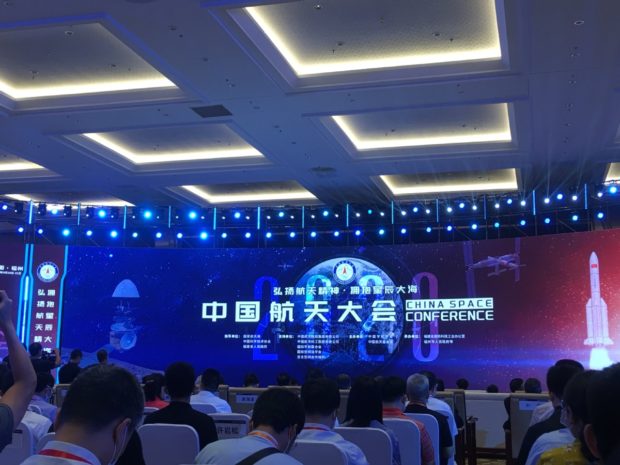China determined to land astronauts on lunar surface

The 2020 China Space Conference opens in Fuzhou, capital of Fujian province, on Sept 18, 2020. Photo by Zhao Lei/China Daily/Asia News Network
BEIJING — China is determined to land its astronauts on the moon and set up a scientific station there, according to a project leader.
Zhou Yanfei, deputy chief designer of China’s manned space program, said on Friday that China wishes to use the manned lunar missions to carry out scientific surveys and technology demonstrations, explore ways to develop lunar resources and strengthen the nation’s space capabilities.
“A new wave of lunar explorations has been emerging in the world, with participants aiming to make sustainable missions to deepen knowledge of the moon and exploit resources there,” he said in a report delivered at the 2020 China Space Conference in Fuzhou, Fujian province. “Unlike other nations, China must depend on its own science and technology to realize our goals.”
The country is independently able to land its astronauts on the moon because it has the technologies, a group of well-trained, innovative professionals and high-efficiency research and management systems, Zhou said.
Planners, designers and engineers have done feasibility research and discussed all aspects of the manned lunar program.
Article continues after this advertisementChinese researchers will have to overcome a long list of technical and engineering difficulties, Zhou said.
Article continues after this advertisement“Our existing carrier rockets can’t perform landing missions to the moon because they are not powerful enough. The Shenzhou-series manned spaceships are not suitable for lunar expeditions. We don’t have a lunar landing capsule,” he said.
“Our ground support system was designed for operations in low-Earth orbit rather than on the lunar surface. Moreover, Chinese astronauts have no experience working on an extraterrestrial body.”
The first step is to produce a powerful launch vehicle.
Zhou said researchers initiated two approaches-making a new heavy-lift rocket capable of deploying more than 35 metric tons of payload in a lunar transfer orbit, or modifying the next-generation rocket designed to carry astronauts, which is under development.
Researchers prefer the latter approach because it would be easier to design and make and would become operational earlier.
It would be used to transport astronauts and components to a lunar transfer orbit to assemble a landing capsule, which will then take astronauts to the moon, according to Zhou.
The new rocket is being designed at the China Academy of Launch Vehicle Technology. Its main body will be 87 meters tall, with a diameter of 5 meters, which would make it almost twice as tall as the Long March 5, currently the biggest of China’s rockets.
The gigantic craft will boast a liftoff weight of about 2,200 metric tons, nearly triple that of the Long March 5.
That will enable the rocket to place a 25-ton spacecraft in a trajectory to get it to the moon, designers have said.